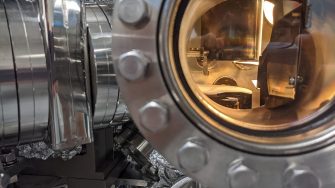Melting things with lasers!
Benjamin discusses his experience in his VIP Team!
Benjamin discusses his experience in his VIP Team!

If you’d told me 2 years ago that I’d be able to play with lasers as part of a university project, I wouldn’t have believed you. This isn’t really an area I thought I’d fit in, as someone who was planning to spend half their degree in UNSW’s biology school rather than the School of Photovoltaic and Renewable Engineering (SPREE).
However, I went for it, and am now a part of the Vertically Integrated Projects (VIP) program, where I am a part of the MiniSolar team. MiniSolar is developing miniature, solar-powered, internet connected devices for bushfire detection and biomedical applications. I am a part of the battery sub-team, and we’re working on tiny, millimetre by millimetre solid-state batteries for future devices. My role has been to work in a team to design, build and test batteries using cutting-edge techniques – and of course, lasers!
For this role, I’ve been privileged to experience all the stages of our project, from working in the Australian National Fabrication Facility (ANFF) laser labs to blast powders into thin film batteries, through to testing them with the precise equipment in the SPREE labs. It’s a bit unlike the traditional coursework labs since nothing is guaranteed to work. More often than not, you’ll be scratching your head and digging through papers trying to figure out why something melted when it really shouldn’t have!
This is also why it has been such a unique experience. It’s let me not only see real experiments in cutting-edge labs, but also let me get experience in carrying them out. Further, it was interesting to see how what you learn in class crops up in areas you don’t expect it. For instance, when we learnt about Proportional-Integral-Derivative (PID) control as part of our control theory course, I would’ve never expected that knowing the advantages and limitations of this would be a key step in troubleshooting our experiments.
It also has helped me understand the rationale, process, and complexities of my lab work in science courses and encouraged me to ask more questions. And of course, it has opened my eyes to what perhaps otherwise non-traditional areas have to offer, and to what unique perspectives I can bring to the table.